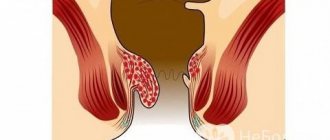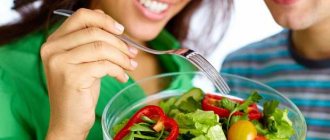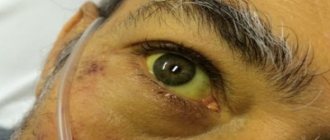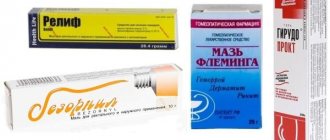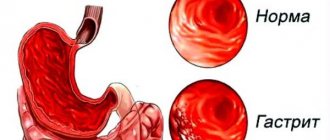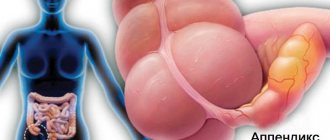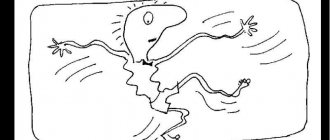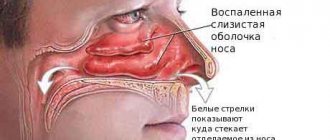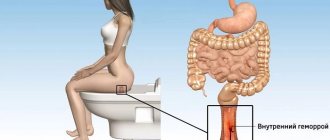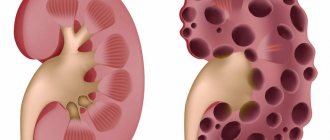Burning and itching in the anal area may appear suddenly! If a severe exacerbation of hemorrhoids develops, what should be done at home?
According to registered data alone, today the number of people who have suffered from this disease is about 80% of the entire world population. Statistics on the incidence of hemorrhoidal pathology in women and men are approximate, since some people, considering this problem as too delicate, do not seek help from specialists in medical institutions.
Exacerbation of hemorrhoids can occur suddenly! Most often these are symptoms in the form of severe burning, itching, and the sensation of a hard object in the rectum. Less commonly - bleeding, fever and mucus discharge from the anal canal, prolapse of a lump (nodule).
All signs of the disease can also quickly disappear; this does not mean that the disease has disappeared completely.
Transformation of the hemorrhoid
Hemorrhoids are characterized by dilation and inflammation of the veins that form hemorrhoids in the lower part of the rectum. In the absence of proper treatment and non-compliance with preventive measures, the disease can become chronic. A chronic disease is accompanied by alternating periods of acute and weakening.
Causes of the disease
The venous system located in the pelvic area is responsible for the intestinal blood supply. If intra-abdominal pressure increases, the outflow of blood from the intestines is disrupted and leads to stagnation in the veins. This provokes an increase in the nodes and the occurrence of inflammatory processes in them, accompanied by bleeding.
Lifting weights is prohibited
The progression of the disease and the manifestation of symptoms occurs due to a number of provoking factors:
- Lifting heavy things and intense physical activity contribute to a sharp increase in pressure inside the abdominal cavity, increasing the likelihood of hemorrhoids falling out;
- Activities associated with the constant need to be in a static position or, conversely, with excessive dynamic activity lead to overflow of the vessels in the abdominal organs with venous blood.
- Pregnancy and childbirth. In the first case, this occurs due to the pressure exerted by the fetus on the abdominal organs. Pushing during childbirth also affects the intestines, increasing pressure and increasing the volume of blood in the vessels;
- Psychological factors. Daily psycho-emotional tension, stress, and nervous breakdowns often cause an exacerbation of the disease.
- Improper functioning of the digestive system. Frequent constipation or diarrhea with difficulty in bowel movement also creates high intra-abdominal tension, and compacted feces injure the mucous membrane. Frequent loose stools adversely affect the bacterial flora of the intestines, provoking inflammatory processes.
Digestive disorders occur due to non-compliance with the anti-hemorrhoid diet. The lack of dietary fiber and fiber, but the high content of refined carbohydrates and fats in the daily diet aggravate the situation. And the consumption of alcoholic beverages, fatty, fried, smoked foods contributes to the influx of venous blood and its stagnation in the nodes.
By eliminating these reasons, you will forget about hemorrhoids forever.
Exacerbation of rectal diseases after alcohol is a common occurrence!
The effect of alcohol on blood vessels is not the most favorable. They expand, small capillaries burst, and inflammation begins. People most often turn to a proctologist for help after a good feast. When the disease develops, alcoholic drinks are prohibited in any quantity.
How long does the acute phase of unpleasant symptoms last? The inflammatory process lasts from 3 to 10 days. The sooner treatment begins, the faster the discomfort will disappear.
https://youtu.be/y-2YAQkdoiI
Features of the flow
Symptoms of the disease, depending on the stage of the pathology
Features of the manifestation of the disease at stage 1:
- practically no symptoms;
- discomfort may occur after bowel movement.
Combined hemorrhoids of the 2nd degree are characterized by the following symptoms:
- during the act of defecation, a feeling of discomfort and itching appears;
- nodes fall out;
- the appearance of pain and burning sensations;
- when the disease progresses to a chronic version, the nodes begin to fall out with little physical activity;
- It is not possible to return the node to its original position on its own.
At the third stage of the disease, the nodes may fall out when a person simply walks.
The disease at stage 3 manifests itself with the following symptoms:
- the appearance of blood discharge during bowel movements;
- feeling of fullness in the intestines after visiting the toilet;
- if the inflammation has become chronic, blood discharge is also observed after defecation;
- nodes fall out when walking.
Combined grade 4 hemorrhoids are characterized by the following symptoms:
- increased pain after completion of bowel movement;
- it is not possible to remain in a sitting or standing position for a long time;
- When it becomes chronic, the disease can only be treated surgically.
Recommendations: what to do at home
The acute stage of the disease can occur at the most inopportune moment. If there is an exacerbation of hemorrhoids, what should you do first?
To relieve symptoms, you need to follow simple recommendations:
- If the stages of exacerbation are caused by constipation, there is no need to strain, trying to quickly empty the intestines of feces. In this situation, it is better to do an enema. In the future, to avoid such cases, follow the diet and drinking regime. Be sure to include fiber in your diet, as it promotes the formation of normal stool;
- During the intensification of the disease, it is recommended to lie down. This will help relieve tension from the muscles of the anal canal;
- At home, with progressive pain, you can apply a cold compress to the inflamed area or take a cool bath with the addition of decoctions of medicinal herbs. By periodically repeating this procedure, the inflammation will decrease and the possibility of infection will decrease.
Treatment for exacerbation of symptoms
The most important point during the period of increasing symptoms is proper treatment. No matter how hard a person tries, he will not be able to quickly get rid of the disease. It is necessary to identify the cause and, after eliminating it, expect a positive result.
During the consultation, a proctologist will diagnose and prescribe the most effective treatment
Therefore, first aid from a proctologist is necessary, who will carefully conduct a diagnosis and identify the causes that influence the development of the pathological process.
In the initial stages, treatment of hemorrhoids during exacerbation is conservative.
How to relieve exacerbation and inflammation? An effective way to correct hemorrhoidal symptoms is to follow a diet and prevent constipation by consuming enough dietary fiber and an optimal amount of fluid.
As the disease progresses, meals should be fractional. It is better to eat food in small portions.
A diet during exacerbation of hemorrhoids can save a person from taking chemical medications. When the disease develops, it is imperative to include fresh vegetables and fruits in your diet, which activate the intestines and normalize its functioning.
For severe pain, non-narcotic analgesics and local painkillers should be used: rectal suppositories, ointments, gels or creams.
Cold compresses are good as an analgesic and anti-inflammatory agent. To do this, you need to take gauze, moisten it with sea buckthorn oil, a solution of furatsilin (or potassium permanganate), or herbal infusion (chamomile, calendula, string) and apply it to the anal passage.
An effective folk remedy is potato compress. To prepare it, you need to take a small tuber, rub it, and wrap it in a thin cloth.
Potato suppositories relieve burning and itching in the anal area
Applying raw potatoes helps reduce inflammation and blood flow.
For bleeding from the anal veins, suppositories (suppositories containing adrenaline, Relief, Natalsid), systemic phlebotonic tablets (Phlebodia, Detralex) and hemostatic drugs (Tronexam, Etamzilat) are used. Anti-inflammatory ointment perfectly relieves symptoms in the external form of the disease.
How to quickly cure acute hemorrhoids
The treatment of the disease during pregnancy and after childbirth must be treated very carefully. Many drugs can harm the fetus, so self-medication is inappropriate.
Hemorrhoid surgery
Hemorrhoid removal
Patients who have not achieved positive results with conservative therapy or who have grade 4 hemorrhoidal disease are candidates for surgical treatment.
Surgical treatment options include removal of hemorrhoidal veins using laser surgery or hemorrhoidectomy using a scalpel . Another alternative is a hemorrhoidectomy , in which a special staple is placed on the varicose vein.
Thrombosed external hemorrhoids indicate the formation of a clot in a varicose vein, which causes severe pain. Treatment consists of removing the varicose vein with the clot.
Complications that may occur
Complications of the disease can include hemorrhoidal bleeding, thrombophlebitis of inflamed nodes, and their prolapse from the anus. Progressive bleeding from the rectum can lead to acute anemia. The consequence of this will be a lack of oxygen in the body due to the low hemoglobin content in the patient’s blood. Anemia is characterized by: weakness, low blood pressure, pale skin.
Thrombosis develops as a result of pinching of prolapsed hemorrhoids by spasm of the external sphincter of the rectum. A blood clot forms and the bumps turn blue. Sometimes this causes pain so severe that the patient can sit or move with great effort. Also in the anal area there is severe itching and swelling of the skin.
If help is not provided in time, the hemorrhoid tissues die. Inflammation of the mucous membrane can spread to the tissues adjacent to the rectum.
Timely contact with a specialist, treatment and compliance with all his instructions will help to avoid these complications and surgical intervention.
Official diagnostic methods
Diagnosis of combined hemorrhoids cannot be carried out outside the walls of a doctor's office. If there is no doubt about the existence of external nodes, since they regularly remind themselves even after an hour of sitting on a chair, then only a specialist can confirm the presence of internal ones. And an external examination with palpation may not be enough; an anoscope is used to reliably examine the condition of the rectum. This is a special device used by a professional proctologist. In addition, there are a number of indications for additional examination methods: colonoscopy, X-ray and ultrasound examination, biochemical method and others.
Disease prevention
Even after treatment, it is necessary to follow basic rules of prevention. This is a set of recommendations: morning exercises, exercises for the outflow of blood from the lower body, adequate fluid intake, a ban on alcohol, prevention of constipation, and the absence of fried, spicy and salty foods in the diet.
Is it possible to play sports when the disease appears? It is better to postpone the event until all symptoms disappear. All types of strength exercises, horse riding, and weightlifting are strictly prohibited.
Exacerbation of chronic hemorrhoids is a signal to contact an experienced specialist. Only a doctor can quickly relieve pain symptoms by choosing the right treatment regimen.
Important
Clinical manifestations
Symptoms of internal chronic hemorrhoids:
- Internal hemorrhoidal veins are usually painless.
- Patients come to the doctor when they see bright red colored blood during or after bowel movements.
- If varicose veins bleed profusely, the blood will usually be on top of the feces.
- The patient may observe mucus discharge along with blood.
- Patients also complain of itching.
Internal hemorrhoidal veins are usually painless, unlike external ones. They become painful only when they undergo necrosis.
